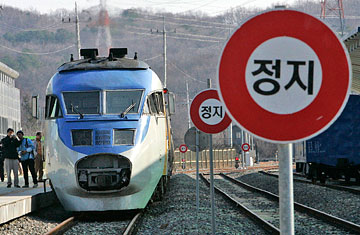
A passenger train pulls into Dora Station, the last train stop in South Korea outside the Demilitarized Zone (DMZ), the day before North Korea enforced stricter border controls on Dec. 1, 2008
Bill Clinton once called the Demilitarized Zone between North and South Korea "the scariest place on earth." But in recent years, the heavily patrolled no-man's land separating the nations had become a lot less terrifying. Due to Seoul's "sunshine policy" of engagement with the North, the once-impenetrable DMZ became a hotbed of renewed contact. Last year, a cargo train line was restored across the border. South Korean tourists were permitted to pass through by road to visit historical sites. And nearby, a Seoul-sponsored industrial park outside the town of Kaesong was developed where South Korean factories churn out clothing and other merchandise, employing North Korean workers. The tense DMZ, oddly, had become a symbol of the growing cooperation between Seoul and Pyongyang, in spite of the six-decade conflict that it represented.
Not anymore. North Korea put a freeze on the new era of warming cross-border relations when Pyongyang tightly restricted travel across the border starting Dec. 1. The train line has been shut down, and the tour buses canceled. Though the Kaesong industrial park will be allowed to remain open, Pyongyang has demanded a reduction of the number of South Koreans permanently working on site, which, when combined with the new limitations on travel, could badly hamper its operations.
The partial border closure is the latest step in a series of hostile actions taken by Pyongyang that have reversed a decade of diplomatic progress between the two Koreas. Earlier this year, North Korea test-fired a barrage of missiles into the sea, and threatened to turn South Korea to "ashes." The source of North Korea's ire is Lee Myung Bak, the conservative president of South Korea who took office in February. His crime: Expecting Pyongyang to match Seoul's generosity with concessions of its own. Under the "sunshine policy," the North received aid, investment and other perquisites from South Korea while offering up little in return.
After his inauguration, Lee put a halt to further economic cooperation until North Korea made progress on dismantling its nuclear weapons program. In 2007, Pyongyang had agreed to end its nuclear program in six-party talks between the U.S., China, Japan, Russia and North and South Korea, but has dragged its feet on implementing the agreement. A new round of six-party talks will be held in Beijing later this month, aiming to reach a final agreement on the process that would allow the international community to verify that Pyongyang has revealed the extent of its nuclear activities.
North Korea has also been irked by South Korea's unusually sharp criticism of Pyongyang's leadership this fall. In November, Seoul co-sponsored a United Nations resolution expressing serious concerns about North Korea's human rights record. Pyongyang is also upset over an intensifying campaign by South Korean activists to float pamphlets attacking North Korea's paramount leader, Kim Jong Il, across the border with balloons. "North Korean power elites think that the ultimate policy goal of the Lee administration is to topple the regime of Kim Jong Il," says Choi Sung, a member of the opposition Democratic Party, who recently met with North Korean leaders in Pyongyang.
North Korea blames Lee's hard-line stance for the border restrictions. In mid-November, a report on Pyongyang's official news agency announcing its new policy warned that "the racket of confrontation" from Seoul's government "is going beyond the danger level." North Korea's hope, analysts say, is to pressure Lee into softening his policies and resume the expansion of aid and investment pursued by his predecessors. Pyongyang, comments Nicholas Eberstadt, a North Korea expert at the American Enterprise Institute in Washington, is "trying to slap the new government back onto the sunshine path."
If that is the plan, it's not working. Lee has shown no sign of backing down, and Pyongyang can ill afford to turn away tourists, trade and other economic benefits. Aid organizations and Korea experts have warned that food shortages in the secretive state are likely to get worse next year, putting the population at risk of another major famine. "North Korea does not want to change itself," says Cho Han Bum, a director at the Korea Institute for National Unification in Seoul. "The recent action by North Korea is based on its calculation that political gain outweighs economic losses." Once again, Kim Jong Il is sacrificing his people's interests for those of his dictatorship.
— With reporting by Stephen Kim / Seoul
